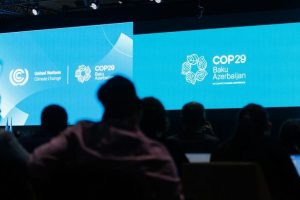BY FITSUM GETACHEW
Climate change is one of the most pressing challenges the world is currently faced with. Ever since the industrial revolution began, there has been a consistent and steady increase in temperature of the earth and the consequences have been noted with the erratic behavior of climatic conditions all over the globe. Extensive drought materializes in unexpected seasons as do excessive rain resulting in massive inundations and devastation. Wild fires erupt in various corners of the world and the damage has been extremely damning. All these are direct consequences of climate change that continues to haunt humanity.
Deforestation has been a widespread phenomenon for various reasons including the search for inhabitants to build urban areas where they can live comfortably. Forests were brutally eradicated due to such expansion of urban areas and constructions of various sorts. The search for more land for farming activities, the extensive usage of coal for energy and woods for fire as well as construction has contributed to massive and relentless deforestation without the concern of replacing the areas destroyed.
Population has been growing at astronomic pace particularly in the developing world and such pressure has brought more challenges in the attempt to feed all this increasing population as food can only be found through extensive and intense farming. The need to provide adequate food to all the people of the world has put immense pressure on land and in the search for available land, forests had to be sacrificed almost indiscriminately and wiped out so that there is abundant land for agricultural works.
Food security is a real challenge in most of the developing world with Africa on the top of the list. Ethiopia has been struggling to meet its food supplies to its ever growing population. This has increased the pressure on the environment as more and more constructions are carried out without taking into consideration the negative consequences of these series of acts that materialized along decades of deforestation. Survey shows that four decades ago the Ethiopian forest coverage was about thirty five percent of the land but now it has dwindled to only four per cent.
Pollution is another factor that has contributed to the heating up of the world even beyond the immediate health issues linked to respiratory complications that we experience in several industrialized and densely populated countries. Certain cities have reached alarming levels of air pollution despite the massive efforts of containment. Nowadays the usage of coal is being severely restricted while cars are made in such a way as to reduce the pollutant fuel. Fuel is being replaced slowly by chargeable electric vehicles. Many industrial plants have received warnings of closure if they do not restrict their emissions.
A series of researches have been carried out through the years and scientists continued to make alarming discoveries on how the current trend is highly dangerous for the planet and humanity in general. They have determined that the current temperature trends are not sustainable and should be severely curtailed. Every industrial power is required to limit all activities that put in danger the environment.
Conferences have been held to outline future strategies to save the world and alternative use of energy has been prospected. Limiting temperature rises and reducing climate change has been suggested. One of the factors that can solidly contribute to the alleviation of temperature and help regularize the erratic behavior of the weather is the re-afforestation of the planet. Every country needs to not only conserve the environment but also contribute more to such efforts through planting trees. This is where the Ethiopian Green Legacy Initiative lies.
Ever since the reformist government has come to power, there has been this immense initiative of planting billions of trees. It began in 2019 with the plan of planting 20 billion tree seedlings in four years. However the results recorded seem very successful. Above all the involvement of the public has been overwhelming earning recognition even abroad.
This multi-year momentous campaign has been promoted and advanced by Prime Minister Abiy Ahmed along with his aids. Planting a medium of five billion tree seedlings in four years was planned but already 18 billion have been planted in three years. This year more than seven billion tree seedlings have been prepared for the rainy season.
The official launch of the Green Legacy Initiative Phase IV took place on Tuesday. June 21, 2022 with the Premier Abiy Ahmed taking the lead along with former prime minister Haile Mariam Dessalegn and former president Dr Mulatu Teshome as well as the deputy premier and foreign minister Demeke Mekonnen.
The numbers show that more than twenty million people have taken part in the campaign. The awareness of the people has also increased. Protection of the environment is becoming a priority to the people. This has been included in the curriculum of students, teaching them to be conscious of the issue and acting accordingly. They are taught to keep clean their neighborhood, schools, etc. from pollutants such as plastic bags and other kinds of rubbish. They are being taught about recycling as the world avails limited resources.
Planting trees has a number of advantages in terms of contributing to the cooling down of the temperature, increasing rainfall that we need for agriculture and drinking water. Drought has become cyclical and even this year we have seen several areas in the country affected by drought killing thousands of cattle and threatening the livelihood of millions.
The UN continues to warn of severe food scarcity to millions in the Horn of Africa while appeals for more funds have intensified. But the world is faced with urgent challenges such as the security issues in Europe and elsewhere. Food prices have skyrocketed raising more alarms in the developing world that are food insecure. The Russia-Ukraine confrontation has worsened the case.
Inflation has become a major threat throughout the world and economists are battling such trend which negatively affects the poorer nations. Ethiopia is one of the victims of spiraling inflationary trends. Already we have a stretched and stressed economic situation due to various issues such as the overall security situation particularly in the north where the consequences of two years of continued battles have left their mark with the depleting of immense resources allocated for the conflict endeavors. The class of population that already used to struggle to make ends meet is now more pressed due to price hikes. For instance fertilizers which are vital to the Ethiopian farmer have registered incredible price rises, so has the price of fuel. The effects create a cascading situation. It becomes a vicious circle.
However, despite this gloomy picture we need to nurture hope that the future can be better if we continue to cover our country with greenery and expand export. Besides more fruits need to be along with indigenous plants with a high probability of blossoming. The recent experiment carried out in the south around Wolayita Soddo of fruits and vegetables has been hailed a huge success. The country has earned eighty million dollars from the export of fruits such as avocado, papaya and mango. The recent visit of the premier to the area has shown to Ethiopians the extent of this new initiative of not only planting tree seedlings but also fruits that have commercial value. If this initiative is taken to another level, there could be more fruits grown and more export. It could also help satisfy the food needs of the people.
The Green Legacy Initiative also has the result of contributing to creating employment to youths who are engaged in preparing the tree seedlings in the tens of thousands of nurseries. Besides, those who work at various levels in the logistics and preparations of the holes for the planting of the seedlings have been engaged and earn a living through this activity.
Reports show that every preparation is ready for the planting of the billions of tree seedlings across the country. The premier has urged all those who can engage in this activity of planting tree seedlings to do it with commitment and continuity throughout the rainy season. He was talking of planting scores of seedlings every day for three months thus meeting the target of planting more than seven billion seedlings.
Looking at the outcome of the previous three seasons about eighty percent of the seedlings have taken root and grown but more is expected in terms of taking care of the planted seedlings. What is more, the premier has been vocal about the idea of expanding this process to neighboring countries with the provision of millions of tree seedlings to them because the phenomenon of climate change is a problem for all humanity and not only for a few countries. The solutions must also assume global behavior with shared approach and common strategy.
The Ethiopian Herald June 23/2022





